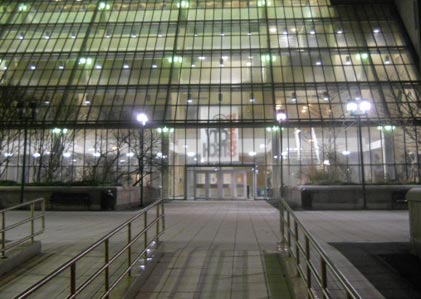Fans of the NBC comedy “Community” know that one of the highlights was how highly regarded the heating, ventilation, air conditioning and refrigeration (HVAC/R) students and faculty were treated at the fictional Greendale Community College’s Conditioning Repair School. The department’s staff was essentially a secret power in the world, calling all the shots at the otherwise troubled and dysfunctional school. The faculty chose only the brightest of students to join its elite ranks, and then made them work even harder once they were admitted. In return, they were set for life in a well-paying and respected alliance of HVAC/R technicians.
Today, mastering the skills of HVAC/R can be an especially useful trade, as all residential and commercial properties have environmental control needs. The most current systems are needed for installation into new homes and buildings, and older systems always are in need of repair or replacement.
HVAC technicians need to be familiar with the principles of thermodynamics and common energy sources, from water heaters to stoves to boilers. Job skills require a blend of hands-on and manual labor plus engineering and mathematical abilities when designing or repairing systems.
The engineering, installation and mechanical skills of HVAC/R technicians can be appreciated anywhere, from southern regions where air conditioning is essential in the summer months to the northern areas where a working heater is indispensable in winter. Work conditions are not always comfortable since it can involve high or low temperatures and manipulation of large ductwork, sometimes at all hours in the case of emergencies.
The Bureau of Labor Statistics (BLS 2018) expects openings in the profession to grow 15 percent nationally between 2016 and 2026, more than double the average for all U.S. occupations. This is expected to create 48,800 fresh positions in the field, joining the 332,900 already working in HVAC around the country. What’s more, the industry also pays well: the median national wage is $47,080 annually ($22.64 per hour).
Like plumbing and other similar trades, apprenticeships are recommended and licensing may be required. While some of the material can be self-taught, many employers prefer a certificate or degree from an accredited HVAC program that shows mastery in several areas. Additional education in specific brands or types of systems can also be an asset.
Students considering seeking an HVAC program can see if one is offered at a nearby community college or trade school. Or they can consider learning from some of the country’s more well-regarded training faci;ities. Some employers also provide their own training programs.
Continue reading for info about five HVAC/R facilities considered particularly noteworthy.
Methodology
There are dozens of HVAC training and certification programs nationwide, but the following five were selected based on a variety of criteria including:
- Affordability of program
- Low student-to-faculty ratio
- Career placement services
- Blend of hands-on training and classroom learning in fundamentals
- Curriculum focus beyond mechanical skills but other useful life/business skills
- Multiple progression tracks/ranges of certificates and degrees
- Labs and training areas with current equipment in different system types
Five State-of-the-Art HVAC/R Programs in the U.S.
Truckee Meadows Community College
For its air conditioning technologies certification program, TMCC provides a blend of hands-on activities in a lab setting, classes in the field, and classroom instruction in modern HVAC principles and techniques. Students work on a variety of environmental control systems and learn to diagnose and repair common and less frequent mechanical problems.
There are a variety of certificates that can be earned based on interests and abilities. The program starts with a 31-credit HVAC/R Certificate of Achievement. Once this is reached, students can leave the program or seek additional certification in areas such as critical systems, refrigeration skills, and construction technologies. This extra knowledge can help them be more marketable in the job field. Along with a variety of math and science skills, students are also required to focus on safety and communication and human relations.
The school also offers instruction in the newest EPA Section 608 standards. Although some schools have a lower student-teacher ratio than TMCC—which is 19 students per instructor—the school was commended for its affordability and how the curriculum can provide usefulness in a variety of professions such as construction or aerospace.
- Location: Reno, NV
- Tuition: $3,456.60 per semester
- Program length: Two years
Georgia Piedmont Technical College
The school’s AAS in air conditioning technology is designed to blend practical application and modern energy theories to prepare students to be hired for and perform well in different positions within the HVAC/R field.
The industrial associate degree program includes three tracks, starting with the 66-credit air conditioning technology program that focuses on residential and commercial system design, knowledge of system components and general troubleshooting. Another is commercial refrigeration, which can be completed in 73 credits with a focus on repair, engineering, and equipment sales. The final program is building automation systems, which is 66 credits and focuses on advanced environmental controls, energy efficiency, and systems management.
In addition to technical knowledge and energy fundamentals, students receive training in math, English, and computer literacy. These skills are especially useful for different types of career needs. Students seeking associate degrees are also required to complete a variety of general studies courses, including humanities and fine arts.
For students who prefer technical certificates over degrees, the school offers two 12-credit options: air conditioning electrical technician training and air conditioning technician assistant training. The school is the oldest technical program in the state and has a good relationship with local businesses. The school also offers a strong career services center that helps with job searches and resume building plus holds regular job fairs.
- Location: Clarkston, GA
- Tuition: $89 per credit for in-state residents; $178 per credit for out-of-state residents; $356 per credit non-U.S. resident
- Program length: 18 to 24 months
Lewis-Clark State College
LCSC provides a bachelor’s degree in HVAC/R technology with training for students who want to gain basic knowledge and apply it to a career as soon as possible.
The school offers three levels of completion in the HVAC field. Students can obtain a technical certificate (55 credits), an associate degree (49 credits), or a bachelor’s degree (120 credits). Students in all three programs receive an overview of commercial and residential HVAC systems, including how to install, repair and maintain them. Students also learn the fundamentals of electricity, motors, and heating sources in a laboratory that offers a variety of systems.
The school stresses the value of communication, public relations, and computation skills for its technical and industrial programs. The programs are also recommended for people already in the industry who want to learn new methods and systems. Some foundational courses may be waived according to experience.
- Location: Lewiston, ID
- Tuition: $6,618 per year for in-state residents; $19,236 per year for out-of-state residents; $10,492 per year for Asotin County residents
- Program length: Three to five years
Ferris State University
Students in this 124-credit BS in HVAC/R engineering technology program learn to build, operate, repair and retrofit HVAC/R systems. The program goes beyond necessary mechanical and manual skills to include knowledge of electronic systems, testing environments, and microcomputer controls. A big focus is on achieving optimal efficiency in various systems by adjusting and testing as needed.
The program facility includes a four-zone computerized air conditioning system that is used as a testing environment for the different types of energy systems. The school offers a 16-to-1 student-faculty ratio. In addition to the on-campus training, students have the opportunity to visit businesses in the West Michigan community to inspect and advise their systems. They are required to complete an HVAC technician internship their junior year as part of the curriculum.
The faculty prepares students for a variety of jobs in the industry, not just as technicians. This can include an estimator, project engineer, systems controller, and systems representative. FSU also offers an associate of science in HVAC/R technology.
- Location: Big Rapids, MI
- Tuition: $12,150 per year
- Program length: Two to three years
New England Institute of Technology
This AS program in refrigeration, air conditioning, and heating technology is designed to teach students the basics of domestic and commercial refrigeration systems, including geothermal power and heat pumps. It is jointly taught by the school’s refrigeration and air conditioning department and the heating department. This provides access to both program’s facilities that include a testing center and different types of equipment.
Students begin the program by learning the basics of heat energy and how it is transferred. Then they move into practical systems for heating and cooling. The program also covers the mechanics of refrigerators and cooling, plus heating with gas, steam, water, and electricity. Units on electrical wiring, welding, and general troubleshooting/common repair needs in the school facility are included since all of these skills can be useful for technicians, installers, or mechanics.
When students complete the program, they can begin applying for a variety of state and national licenses and taking certification exams. Notably, the school assists in creating apprenticeships or internships.
- Location: East Greenwich, RI
- Tuition: $28,200 per year
- Program length: 18 months to three years



